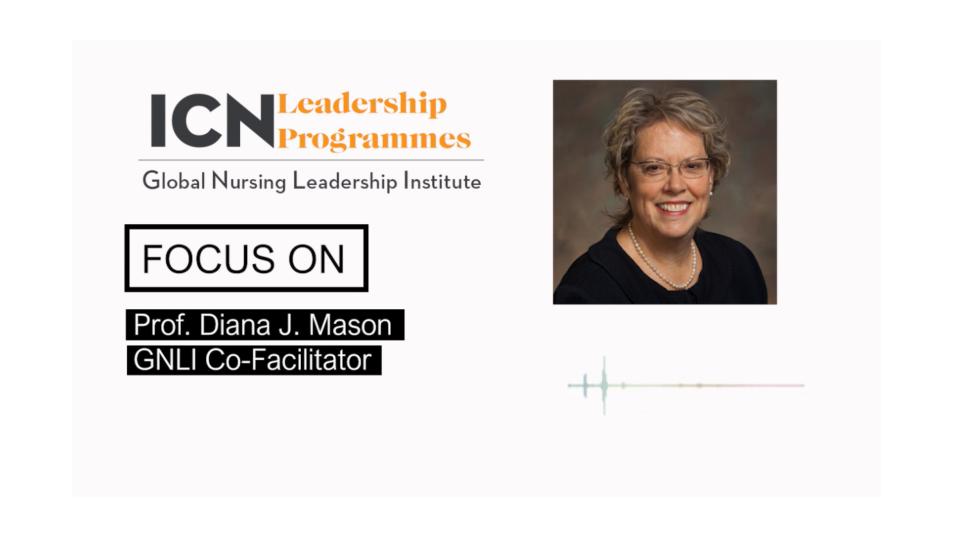GNLI Alumni Speak Out - Part 2

“I feel the commitment to help develop nurses to be strategic leaders”
Professor Diana J. Mason, GNLI Co-Facilitator
Interview by Gyorgy Madarasz, ICN Press Officer
The International Council of Nurses (ICN) runs its Global Nursing Leadership Institute programme for executive level nurses from around the world with the help of an internationally recognised professional team. Professor Diana Mason – who has always followed three major areas in her professional life as a nurse: education, public health and media - will be part of this team again in 2019 as co-facilitator.
Professor Mason sees journalism as a key part of her practice as a public health nurse. She takes the work of educating the public about health and health policy very seriously. In her radio programme, that she produces and hosts in New York State (“HealthCetera in the Catskills”), she talks a lot about health policy and tries to raise people’s awareness of the importance of paying attention to policies that governments and even private entities set. “I would say that my heart is in the world of creating healthier communities locally and globally, and I see policies as tools to do that, and media as a strategic tool to help advance policies,” she said.
As a regular guest speaker at the GNLI programmes over the years, Professor Mason has joined the course facilitation team because she feels the commitment and passion for getting nurses to realise that one of their greatest contributions is to be part of the broader discussions of health and healthcare. “We are with patients 24/7, we are in their homes, we are with them at their most vulnerable times when they are in a hospital or in a clinic and that gives us a special perspective on people’s lives and what helps to make them healthy, what good healthcare looks like,” she added. “I feel this strong commitment to helping nurses to think deeply and strategically about being leaders in health and healthcare.”
She believes that the GNLI programme is fabulous for preparing global nurse leaders because it gives them the space to step back and think deeply about how to develop more effective strategies for influencing policy. The participants are already leaders who have thought about policy, but this programme gives an opportunity to think more deeply about what their role in shaping health policy is and how they can be more effective in doing that. “We do spend time talking about how you frame a policy issue, how you message it, and how you effectively deliver those messages,” she explained.
Professor Mason pointed out that another really strong component of the course is that the participants are immersing themselves in global health and social policy issues. “I think the half day experience with WHO, the dinner where you are meeting with people from other NGOs that are concerned about health, I think all of that enables you to broaden your own perspective, make really good connections, and learn about some of the policy and political issues around advancing health,” she added.
She also highlighted that GNLI uses active learning, case studies, all kinds of exercises that people engage in. The participants bring what they know about the situation, and the course facilitation team creates a community where everybody is learning from each other.
Professor Mason explained that the GNLI programme is designed for nurses who are leaders in their country, Chief Nursing Officers or head of government divisions, deans, chief nurse executive officers in healthcare organisations or CEOs of organisations. GNLI targets those nurses who are already leaders in their own country and want to think more deeply about how to broaden their focus to global issues, to regional issues, and to develop networks, relationships, ideas and strategies for moving forward some regional or global policy issues.
She believes that participating in the GNLI programme is very intense, since it includes a one-week residential programme (preceded by preparatory work and followed by work on action projects), but “the setting is beautiful, the food is great, people are fabulous and it’s just a lovely setting to think more deeply and to be challenged,” she added.
She also outlined that one of the rich parts of GNLI experience is the relationships that the participants develop with other nurse leaders from around the world and these relationships continue after GNLI. “I know nurses who have participated in GNLI in the past and remained connected, they are working on global issues, they are working on regional issues and they are working on issues more effectively in their local and state national communities,” she concluded.
The ICN’s Global Nursing Leadership Institute offers senior and strategic leadership development at the executive level for nurses. The programme draws on the expertise of an international faculty, allowing participants to review and enhance their national and global leadership skills and behaviours within a collaborative and stimulating learning culture.
Registration for the 2019 programme is open between 2-31 January 2019.
Click here for more information.
Listen: